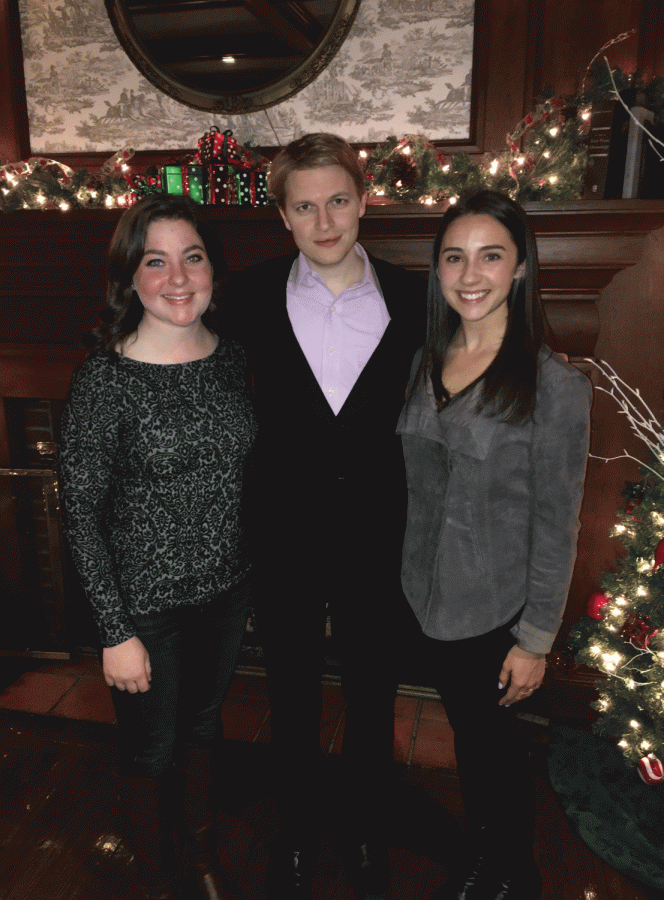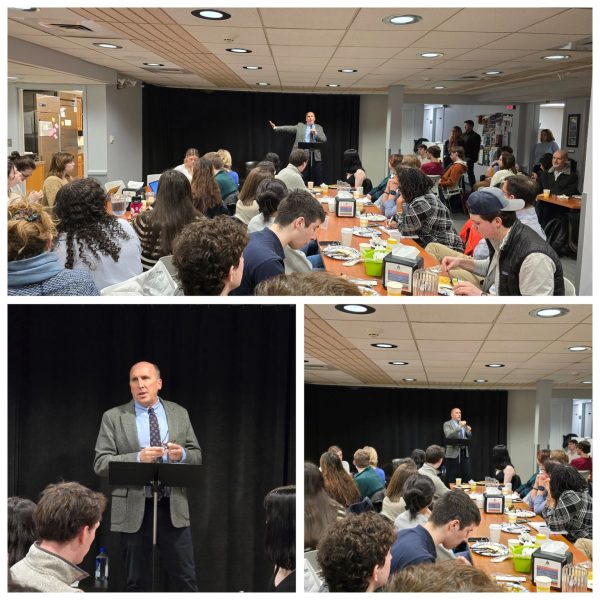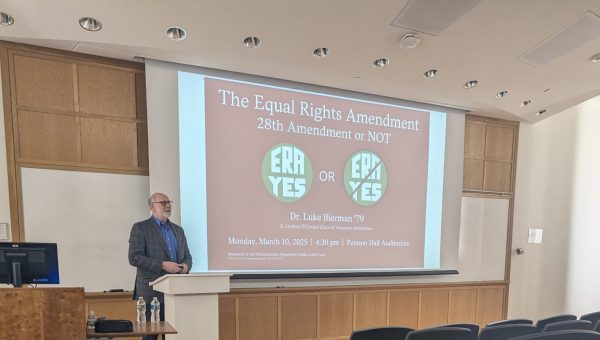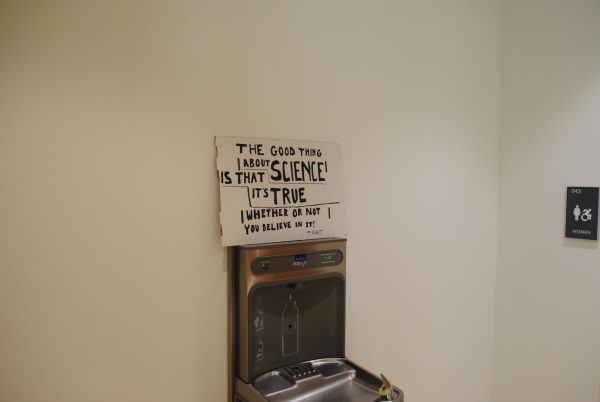Ronan Farrow Speaks at Colgate’s Annual Milmoe Workshop in Journalism
On Thursday, November 30, students, faculty, staff and local community members crowded into Love Auditorium to hear from acclaimed journalist Ronan Farrow.
Farrow was brought to Colgate on behalf of the annual Milmoe Workshop in Journalism. The Colgate Maroon-News and the Center for Leadership and Student Involvement (CLSI) helped plan this event.
Editors-in-Chief seniors Jackie Dowling and Megan Leo introduced Farrow and touched on many of his accomplishments.
Farrow’s work in human rights and foreign policy has been recognized internationally. He has been published in numerous publications, worked as an anchor and investigative reporter for NBC, and anchored his own cable news program, Ronan Farrow Daily, on MSNBC.
In her introduction, Dowling stated that Farrow is recognized most recently for his vigorous investigative reporting that uncovered numerous charges of sexual assault levelled against Hollywood producer Harvey Weinstein.
“Publishing his first piece on the subject in The New Yorker in early October, Farrow has provided a crucial platform for the survivors of sexual misconduct to express their voices. As the discourse surrounding sexual assault permeates across college campuses, Farrow brings a current, informed perspective to this fundamental issue of human decency and respect,” Dowling said.
After thanking Colgate and praising the positive initiatives taken by The Colgate Maroon-News and CLSI, Farrow discussed the many challenges we currently face.
“We are inheriting a sequence of challenges that sometimes seem almost overwhelming and insurmountable including pandemic disease, a changing climate, dependence on fossil fuels, a world threatened by the spread of dangerous weapons of destruction, nuclear weapons, societies in every part of the planet that are riven by tribal and ethnic rivalries and a rape culture that is only now being addressed in national conversation and being pulled out of the shadows,” Farrow said.
Farrow strongly appealed to the student body of Colgate, emphasizing that even if students don’t know their particular career path right now, they can still sift through options and try to make a difference.
He related back to his own career path and how he became a lawyer, only to realize it was not for him. Farrow then explained that he shipped off to Afghanistan as a civilian working for the State Department. Farrow came to realize that he could make a difference through generating stories about the injustices he was witnessing. He began submitting stories through the Op-Ed section at prominent news outlets.
“Writing, more than ever, is meritocratic and powerful way to break into the industry,” Farrow said.
At the beginning of his career in journalism, Farrow sought out the biggest platforms to tell the stories he thought were being left out of the news cycle. He chose to focus his career on deep investigative reporting rather than breaking news. Through delving into certain hot-topic issues at length, Farrow generated solid, high-quality newsgathering.
It was through this meticulous style of reporting that Farrow unearthed a dark side of Hollywood. He explained that through pursuing stories of sexual harassment within the industry, many pointed him towards one of the most powerful men.
Through securing exclusive interviews with victims, most of whom were reluctant to come forward and initially requested to remain anonymous, Farrow was slowly able to build a strong case against Weinstein as a serial rapist.
Farrow expressed the importance of determination and also, caution. He reflected that this was a process that required a high level of sensitivity. The nature of these stories required patience, as victims began to confront their past on their own timetable.
Farrow discovered that the stories of Weinstein’s victims had been covered up and suppressed through lawyers, psychological torture, public relations strategies, powerful political alliances and diverted through positive monetary contributions to society. In addition, Weinstein hired spies to threaten and undermine reporters working to expose him.
Through his diligent reporting, Farrow exposed how Weinstein had been able to silence and delegitimize vulnerable women. Therefore, he realized he was not only uncovering traumatic stories, but also an abusive power system that allowed malicious men, like Weinstein, to operate. He stressed that this is a story bigger than a man and his crimes – it shows that there is a lot more to question and a lot more to uncover.
Farrow emphasized that the way journalists choose to convey information has an immense effect on shaping public reaction. His series of pieces about Weinstein published in The New Yorker convey a crucial talent for revealing the human side of a deeply disturbing storyline.
Farrow then opened up the floor for questions.
Eli Cousin, a sophomore, asked about the politicization of sexual assault.
“I fear that the issue of sexual assault is being politicized in America. It seems like this issue is heading down a slippery slope where people may begin to care about it only when it’s in their interest, in the political world specifically,” Cousin said.
Farrow said that this is not a partisan issue. Rather, it’s about the abuse of power. He believes that most audiences understand that this issue goes beyond politics, and it’s our job to prevent it from descending into political rancor.
Sophomore Max Baron brought up a question about the hyperpolarization of news organizations, and organizations that manufacture sham stories.
Farrow answered that most journalists are able to see through attempts to undermine reporting. He explained that our newsfeeds are constantly flooded with baseless, nonsense content and it’s up to us to be skeptical and hold up the banner of truth.
First-year Fiona Grove asked about the complexities of representing sexual assault, and the impression that sexual assault claims need to be black and white.
Farrow responded that there is a cascade of reporting covering grey areas, and through stimulating conversations, hopefully they won’t continue to exist as grey areas anymore.
Senior Emily Brand inquired about the firing of journalists, such as Matt Lauer and Charlie Rose, over allegations of rampant sexual assault. Farrow explained that this is an issue that occurs in every industry – in every aspect of our society, there are systems in place that allow for influential people to abuse power with impunity.
Farrow stressed that is crucial that our generation provokes meaningful change through turning conversations into reforms.
Contact Maddie Veronis at mveronis@colgate.edu.






